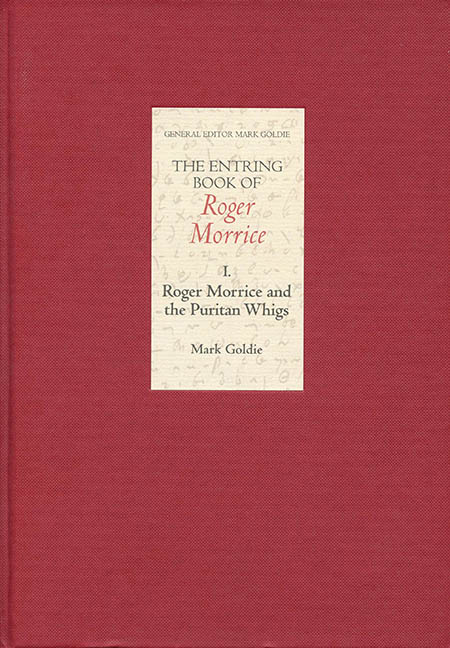Book contents
- Frontmatter
- Contents
- List of Illustrations
- Foreword
- Preface
- Notes on the Editors
- Acknowledgements
- Reader's Guide
- Abbreviations
- Genealogical Tables
- Maps
- Maps
- 1 Politics and Religion in the Era of the Entring Book
- 2 Roger Morrice: Fragments of a Life
- 3 The Text of the Entring Book
- 4 Puritan Whigs
- 5 Country Whigs
- 6 Middle-Way Religion
- 7 The History of the Puritans
- 8 Epilogue: The Entring Book and the Historians
- Appendices
- Bibliography
- Index
- Frontmatter
- Contents
- List of Illustrations
- Foreword
- Preface
- Notes on the Editors
- Acknowledgements
- Reader's Guide
- Abbreviations
- Genealogical Tables
- Maps
- Maps
- 1 Politics and Religion in the Era of the Entring Book
- 2 Roger Morrice: Fragments of a Life
- 3 The Text of the Entring Book
- 4 Puritan Whigs
- 5 Country Whigs
- 6 Middle-Way Religion
- 7 The History of the Puritans
- 8 Epilogue: The Entring Book and the Historians
- Appendices
- Bibliography
- Index
Summary
The demise of the Puritan Whigs
PURITAN Whig politics persisted until the Revolution, yet declined rapidly thereafter. The process is complex, and in this chapter we shall find, during the 1690s and beyond, considerable remnants of it, ambiguously intermingled with new patterns of thought and action. At the level of formal politics the transition is best explored through the circle around Robert Harley, who, though a future Tory prime minister, had his roots in the heartland of the Puritan Whig nexus. At the level of political and religious ideas we shall explore the case of John Toland, who became notorious as a deist and republican and yet who likewise had roots among Morrice's Puritan networks. In the first instance, however, we need to sketch general reasons why the Revolution marked the beginning of a decline.
In large measure it was the result of generational change. Few of the gentry who fought Parliament's war in the 1640s and few of the clergy ejected in 1662 survived the final decade of the century. Many sons, and more certainly grandsons, of Civil War families did not share the same values as their fathers and grandfathers, and the attractions of Dissent became small for gentlemen once the personal ties that bound them to the ejected clergy faded. Whereas the older generation could recollect the ejected clergy as respected and often senior ministers of the national Church before 1662, as holders of great London pulpits, men invited to preach before parliament, heads of Oxford and Cambridge colleges, men of authority and piety, but brutally cast aside in 1662, no such pathos attached to the younger Dissenting ministers of the next generation. The importance of personal connections needs emphasis. Where the Bartholomeans had been tutors to, or fellow students with, the parliamentary and county gentry during the latter's university days, the new Dissenting ministers rarely had any such intimate connection. During the 1690s the passing of the generations was most marked. Among the Puritan Whig politicians, Sir John Maynard died in 1690, William Sacheverell in 1691, William Harbord in 1692, John Swinfen in 1694, Richard Hampden in 1695, Lord Wharton in 1696, Sir Edward Harley in 1700, and Hugh Boscawen in 1701. With the deaths of Lords Anglesey and Robartes in 1685–6 there were no longer peers with Puritan roots sitting in the privy council.
- Type
- Chapter
- Information
- The Entring Book of Roger MorriceRoger Morrice and the Puritan Whigs, pp. 194 - 224Publisher: Boydell & BrewerPrint publication year: 2007

